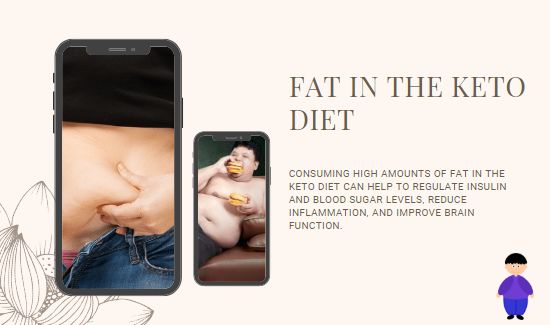A brief explanation of the keto diet
The ketogenic diet, commonly referred to as the keto diet, is a low-carbohydrate, high-fat diet that has gained popularity in recent years due to its potential benefits for weight loss and various health conditions. The keto diet emphasizes consuming high amounts of dietary fat, moderate protein, and very low carbohydrates. This macronutrient ratio is designed to put the body into a metabolic state called ketosis, where it primarily burns fat for fuel instead of carbohydrates. In this introduction, we will explore the importance of macronutrients in the keto diet and how this diet works to achieve its goals.

Definition of the ketogenic diet
The ketogenic diet is a high-fat, low-carbohydrate, and moderate-protein diet designed to promote the production of ketones in the liver. It is based on the concept that when the body is starved of carbohydrates, it switches to a state of ketosis, where it primarily burns fat for energy.How the keto diet works
The keto diet works by reducing the intake of carbohydrates, which are the body's primary source of energy. By severely limiting carbohydrate intake, the body must find alternative sources of energy. In the absence of carbohydrates, the liver begins to convert fat into ketones, which can be used as an alternative source of energy.Role of fat in the keto diet
Fat plays a crucial role in the keto diet. Since carbohydrates are severely limited in the keto diet, the body must rely on fat for energy. The consumption of high amounts of fat in the keto diet helps to keep the body in a state of ketosis, which is the goal of this diet. In the absence of carbohydrates, the body breaks down fat into ketones, which are then used for energy. Consuming enough fat also helps to keep the body feeling full and satisfied, as fat takes longer to digest and provides a steady source of energy. Furthermore, consuming high amounts of fat in the keto diet can help to regulate insulin and blood sugar levels, reduce inflammation, and improve brain function. Overall, the role of fat in the keto diet is to provide the body with the necessary fuel to achieve and maintain a state of ketosis.
Importance of fat in the keto diet
Provides energy: Fat is a dense source of energy, containing 9 calories per gram. When the body is in ketosis, it primarily uses fat for energy, making it a critical component of the keto diet. Consuming adequate amounts of healthy fats provides the body with the energy it needs to function optimally, especially during activities that require sustained energy, such as exercise.
Helps to maintain a state of ketosis: The primary goal of the keto diet is to achieve and maintain a state of ketosis, where the body burns fat for energy instead of carbohydrates. Consuming high amounts of fat in the diet helps to keep the body in a state of ketosis. Fat is broken down into ketones, which are then used as a source of energy by the body. If fat intake is insufficient, the body may not be able to maintain a state of ketosis.
Helps to control hunger and increase satiety: Fat takes longer to digest and helps to keep the body feeling full and satisfied for longer periods. This can help to reduce the desire to snack or overeat, making it easier to stick to the keto diet. In contrast, diets that are high in carbohydrates and low in fat can leave people feeling hungry and unsatisfied, leading to overeating and weight gain.
Helps to regulate hormones: Hormonal imbalances can have a significant impact on overall health and can be linked to a variety of health conditions. Consuming adequate amounts of healthy fats in the keto diet can help to regulate hormones, particularly those involved in appetite, metabolism, and mood. By keeping hormones balanced, the body can function more optimally and reduce the risk of chronic diseases.
The importance of fat in the keto diet cannot be overstated. Fat provides the body with the energy it needs to function optimally, helps to maintain a state of ketosis, controls hunger and increases satiety, and regulates hormones. It is essential to consume adequate amounts of healthy fats in the keto diet to ensure the diet is effective and sustainable.

What are the best sources of fat for a keto diet?
When following a keto diet, it is important to consume the right types of fats. Here is an explanation of healthy and unhealthy fats, and the best sources of healthy fats for a keto diet:
Healthy and Unhealthy Fats: Not all fats are created equal, and some fats are healthier than others. Saturated fats and trans fats are considered unhealthy fats, as they can increase the risk of heart disease, while monounsaturated and polyunsaturated fats are considered healthy fats that can promote heart health. It is important to choose healthy fats when following a keto diet, as consuming unhealthy fats can undermine the potential health benefits of the diet.
Best Sources of Healthy Fats for a Keto Diet: Here are some of the best sources of healthy fats for a keto diet:
- Avocado: Rich in monounsaturated fats, fiber, and various vitamins and minerals.
- Coconut oil: High in medium-chain triglycerides (MCTs), which are easily converted into ketones by the liver.
- Olive oil: Rich in monounsaturated fats and polyphenols, which have been linked to numerous health benefits.
- Nuts and seeds: Almonds, walnuts, chia seeds, and flaxseeds are all excellent sources of healthy fats and fiber.
- Fatty fish: Salmon, mackerel, and sardines are rich in omega-3 fatty acids, which are known for their anti-inflammatory properties.
- Grass-fed butter and ghee: Rich in conjugated linoleic acid (CLA) and other healthy fats, grass-fed butter and ghee are healthier options than regular butter.
- Cheese: Some types of cheese, such as cheddar and blue cheese, are high in healthy fats and protein. However, it is important to consume them in moderation, as they can be high in calories.
The best sources of healthy fats for a keto diet include avocado, coconut oil, olive oil, nuts and seeds, fatty fish, grass-fed butter and ghee, and some types of cheese. It is important to choose healthy fats when following a keto diet to maximize the potential health benefits of the diet.
How much fat should be consumed in a keto diet?
Here is an explanation of the macronutrient ratios in the keto diet and the importance of individualization when determining the amount of fat to consume:
- Macronutrient Ratios in the Keto Diet: The keto diet is a high-fat, low-sugar diet that is intended to place the body into a condition of ketosis. To achieve this state, the macronutrient ratios in the diet must be adjusted to limit the consumption of carbohydrates and increase the consumption of healthy fats. The typical macronutrient ratios for a keto diet are as follows:
- 70-75% of daily calories from fat
- 20-25% of daily calories from protein
- 5-10% of daily calories from carbohydrates
- Importance of Individualization: It is important to note that the exact amount of fat that an individual should consume on a keto diet will vary depending on a range of factors, such as age, gender, activity level, and metabolic rate. Some people may require more or less fat in their diet to maintain a state of ketosis and achieve their weight loss goals. As a result, it is essential to work with a healthcare professional or a registered dietitian who can help to individualize the diet to meet specific needs.
The amount of fat that an individual should consume in a keto diet will depend on their unique needs and goals. While the typical macronutrient ratios for a keto diet are 70-75% of daily calories from fat, 20-25% of daily calories from protein, and 5-10% of daily calories from carbohydrates, it is important to individualize the diet to ensure optimal results. Working with a healthcare professional or registered dietitian can help to determine the appropriate macronutrient ratios and overall caloric intake needed to achieve success on a keto diet.

Conclusion
Fat plays a crucial role in the keto diet by providing energy, maintaining a state of ketosis, controlling hunger and increasing satiety, and regulating hormones. Healthy fats are the best sources of fat for a keto diet, and examples include avocado, coconut oil, olive oil, nuts and seeds, fatty fish, grass-fed butter and ghee, and some types of cheese. It is important to individualize the amount of fat consumed in a keto diet to ensure optimal results, and working with a healthcare professional or a registered dietitian can help determine the appropriate macronutrient ratios and overall caloric intake.
For those considering the keto diet, it is important to carefully consider the potential benefits and risks and to ensure that the diet is appropriate for their individual needs and goals. While the keto diet can be an effective way to lose weight and improve metabolic health, it may not be suitable for everyone, and it is important to consult with a healthcare professional before starting the diet. Additionally, it is important to choose healthy sources of fat and to monitor nutrient intake to ensure that the diet is nutritionally balanced. With proper guidance and individualization, the keto diet can be a safe and effective way to achieve weight loss and improve overall health.






